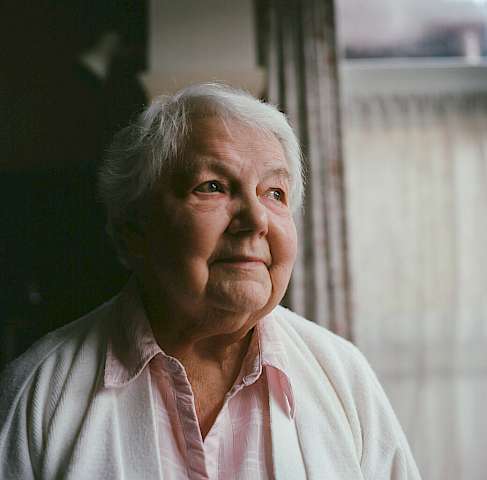Sylvia was brought back from evacuation during the war as a ten-year-old to be the main carer for her baby brother while her mother was unwell.
Ep02: That Was My Job
Transcript:
Sylvia: Well, my mother had to give up work at 17. You see, married women didn’t work. And my mother should have gone to work. She wasn’t really domesticated at all and she was very bright, and she didn’t ever have a chance to use her brain. And I think that was at the root of a lot of her trouble, she suffered from anxiety and depression most of her life.
[Theme music]
My name is Sylvia Clarke. I was born on the 5th of January 1932, in East London. I went to school in Forest Gate and passed the scholarship to the local grammar school. I taught for well over 30 years.
Rosa: I’m Rosa Schling, I’m a new parent, and I’ve been recording memories of childcare and parenting in London’s East End. This is Holding the Baby, an On the Record podcast.
You weren’t the first child to be born to your mum and dad were you?
No, no. My mother lost twins actually, in the first year of her marriage. And then she had my brother, elder brother, and in those days childbirth was a very different matter and they told her at the time that he was dead. So she had this terrible fear of it. As I say, they told her that she wouldn’t have any more children.
So, it was somewhat of a surprise when you came along
It was certainly was, yes!
I suppose when my grandmother was alive she did quite a lot of looking after us. My mother took to her bed, which was quite often, and when that happened I stayed at home to look after David. David was the younger one.
[Music]
When I was seven I was evacuated to Norwich and I came back home when David was about nine months old and my mother realised she wasn’t going to be able to look after him, so that was my job to do.
How did you feel about going home, apart from surprised?
Well I was shocked, it was so unexpected. It was the thought of not going back, because I loved living in the country.
I don’t remember an awful lot, except I know I had to collect the rations, when we were still rationed, at the little dairy round the corner, and if I took David with me in the pram, and if I left him out of the pram, and he looked so innocent and people would go up and say ‘What a lovely boy then’ and he’d start yelling, and I had to go out and pacify him and lose my turn in the que.
How did you balance looking after David and going to school yourself?
Not very well.
[Music]
I mean to me it as an escape to go to school, but I missed an awful lot of the first two years. I remember once he did my homework for me. It was on the dining table, I think it was my maths, and our maths teacher was terribly strict, and she counted every page when you needed a new book. I popped out to the toilet or something and he had ‘Done your sums for you!’ And I panicked then. I had to tear the pages out carefully so that hopefully it wasn’t noticeable. He was only trying to be helpful but, could have killed him.
Especially when you were a child and there were all these demands being made on you to look after David, what do you think would be different if that happened today?
I certainly resented it, I resented not being able to get to school I know. I don’t think the situation seems to arise much these days, they all go to the social services and do this and that don’t they?
Was there ever any question for you about whether you’d carry on living with your family?
Well no, because my mother was always ill and that’s it, you know, right from the time I came back from evacuation, she was never well. And you see, she was on the change, she was about 44 I think when he was born.
You said you thought it was some kind of depression that she had?
I think it was postnatal depression really. But you see in those days they didn’t recognise it as such. But now of course they do treat it as an illness.
[music and end credits]


